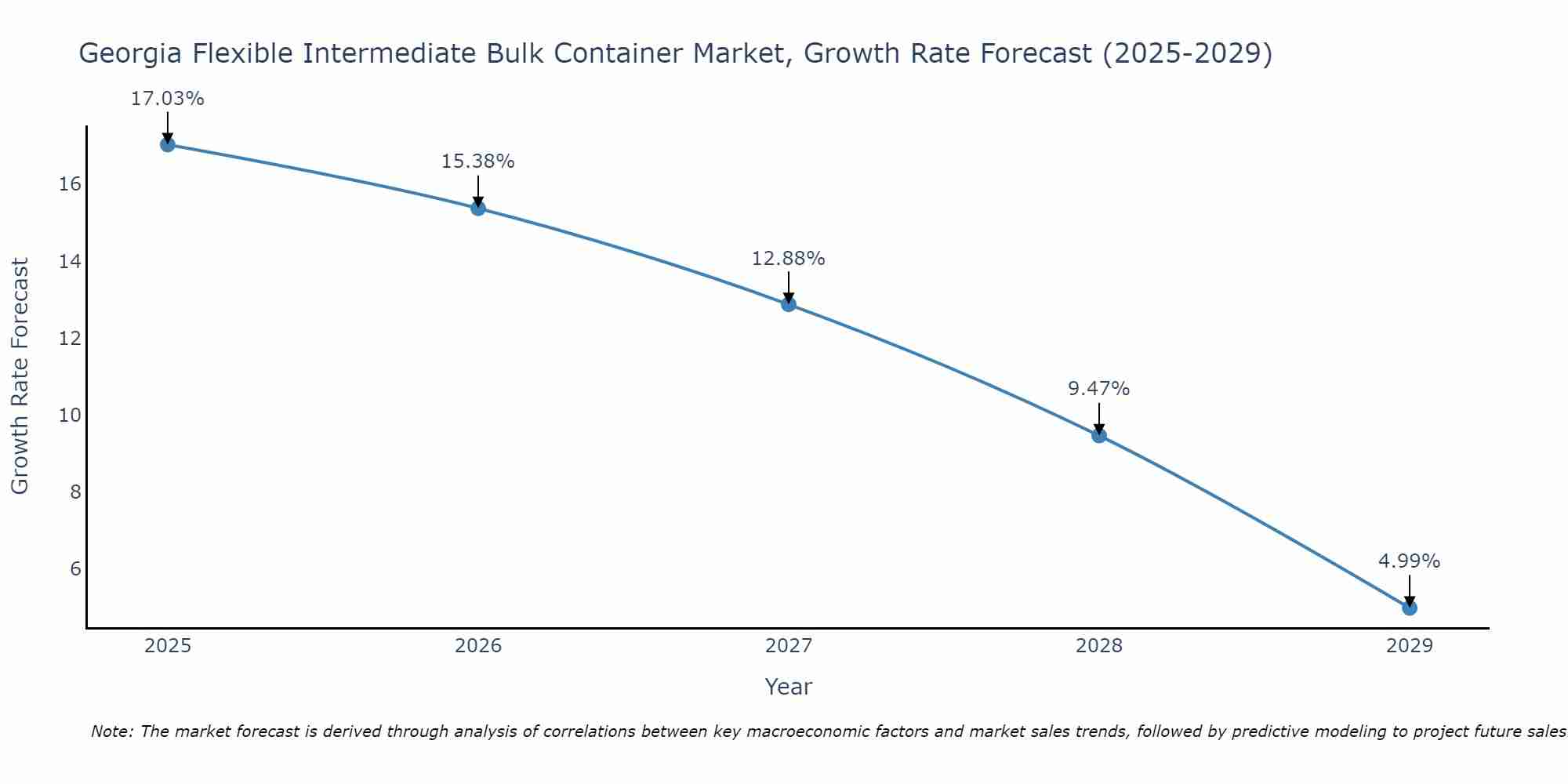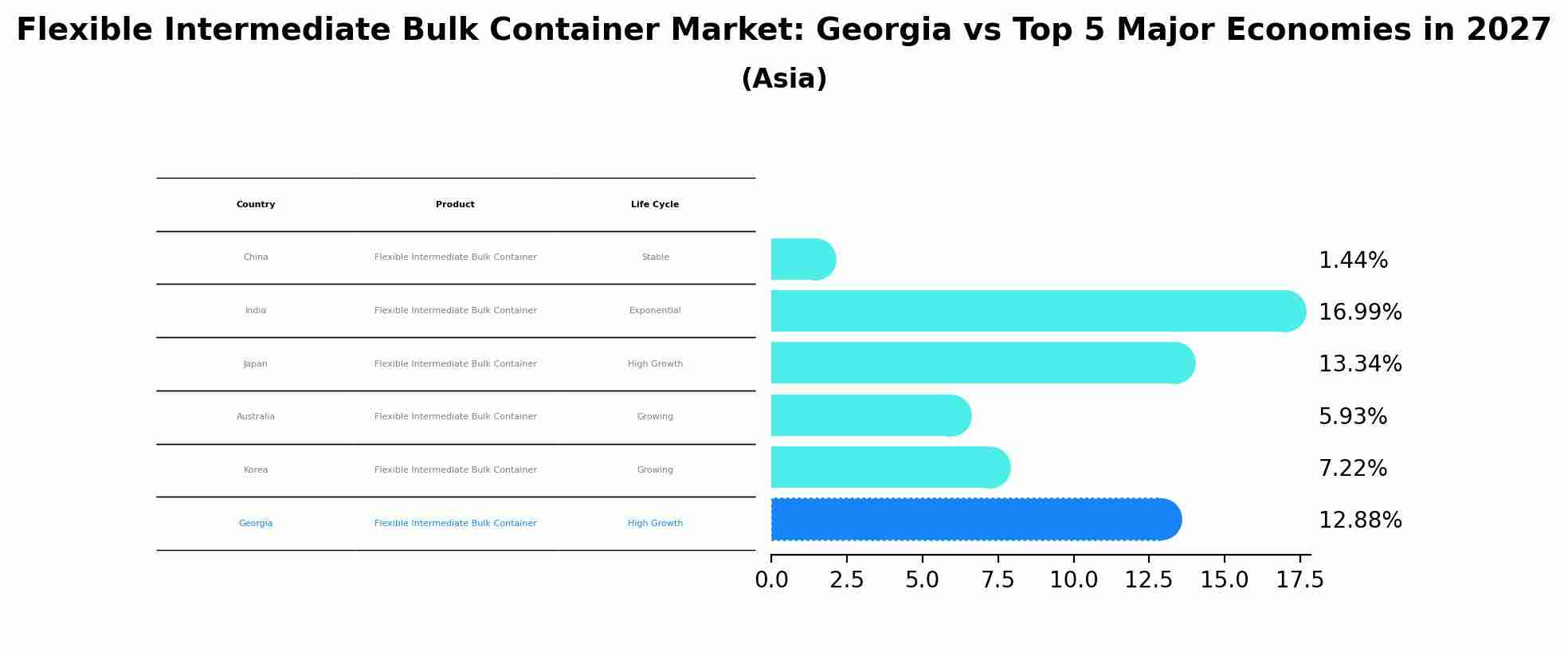Georgia Flexible Intermediate Bulk Container Market Outlook | Share, Size, Revenue, Trends, COVID-19 IMPACT, Forecast, Industry, Value, Companies, Analysis & Growth
| Product Code: ETC373920 | Publication Date: Aug 2022 | Updated Date: Jul 2025 | Product Type: Market Research Report | |
| Publisher: 6Wresearch | Author: Sachin Kumar Rai | No. of Pages: 75 | No. of Figures: 35 | No. of Tables: 20 |
Georgia Flexible Intermediate Bulk Container Market Size Growth Rate
The Georgia Flexible Intermediate Bulk Container Market could see a tapering of growth rates over 2025 to 2029. Starting high at 17.03% in 2025, the market steadily declines to 4.99% by 2029.

Flexible Intermediate Bulk Container Market: Georgia vs Top 5 Major Economies in 2027 (Asia)
Georgia's Flexible Intermediate Bulk Container market is anticipated to experience a high growth rate of 12.88% by 2027, reflecting trends observed in the largest economy China, followed by India, Japan, Australia and South Korea.

Georgia Flexible Intermediate Bulk Container Market Synopsis
The Georgia Flexible Intermediate Bulk Container (FIBC) market is experiencing steady growth driven by the state`s diverse industries such as agriculture, construction, and chemicals. FIBCs, also known as bulk bags or super sacks, are widely used for transporting and storing a variety of goods in bulk quantities. The market is witnessing a demand for FIBCs due to their cost-effectiveness, eco-friendliness, and efficiency in handling and transporting goods. Key players in the Georgia FIBC market include manufacturers, distributors, and suppliers who cater to the varying needs of different industries. As the economy continues to grow, the demand for FIBCs is expected to rise, presenting opportunities for market expansion and product innovation to meet the evolving needs of Georgia`s industrial sectors.
Georgia Flexible Intermediate Bulk Container Market Trends
The Georgia Flexible Intermediate Bulk Container (FIBC) market is witnessing several key trends. Firstly, there is a growing demand for FIBCs in industries such as agriculture, construction, and chemical due to their cost-effectiveness and eco-friendly nature. Secondly, there is a shift towards custom-designed FIBCs to meet specific requirements of different industries, leading to increased customization options. Additionally, advancements in FIBC technology, such as the development of anti-static FIBCs for hazardous materials handling, are gaining traction in the market. Moreover, sustainability is becoming a crucial factor, with an increasing focus on using recyclable materials and reducing carbon footprint in FIBC production. Overall, the Georgia FIBC market is evolving towards more specialized, sustainable, and technologically advanced solutions to cater to diverse industry needs.
Georgia Flexible Intermediate Bulk Container Market Challenges
In the Georgia Flexible Intermediate Bulk Container (FIBC) market, challenges include intense competition from both domestic and international manufacturers, fluctuating raw material prices, and evolving regulations and standards related to packaging and transportation. The market is also impacted by the need for continuous innovation and customization to meet varying customer requirements while maintaining cost-effectiveness. Furthermore, ensuring quality control and compliance with industry standards pose additional challenges for FIBC manufacturers in Georgia. Adapting to changing market trends and technological advancements, as well as addressing sustainability concerns, are crucial factors that companies in the Georgia FIBC market must navigate to stay competitive and sustain growth in the industry.
Georgia Flexible Intermediate Bulk Container Market Investment Opportunities
The Georgia Flexible Intermediate Bulk Container (FIBC) market presents various investment opportunities due to the increasing demand across industries such as agriculture, construction, and chemicals. With the growing trend towards sustainable packaging solutions, there is a rising need for FIBCs that are eco-friendly and durable. Investors can consider opportunities in manufacturing FIBCs using innovative materials, such as recyclable or biodegradable options, to cater to this demand. Additionally, investing in technology to improve FIBC design for better efficiency and safety features can also be lucrative. Collaborating with local businesses in Georgia to supply FIBCs for their specific needs can further enhance market presence and profitability in this growing sector. Overall, the Georgia FIBC market offers potential for investment growth by tapping into the sustainable packaging trend and catering to diverse industry requirements.
Jordan Agar Market Government Policies
The government policies related to the Georgia Flexible Intermediate Bulk Container (FIBC) market primarily focus on ensuring product safety, quality standards, and environmental sustainability. Regulatory bodies such as the Georgia Department of Agriculture and the Georgia Environmental Protection Division enforce guidelines for FIBC manufacturers to comply with safety and quality standards. Additionally, environmental regulations promote the use of eco-friendly materials in FIBC production and encourage recycling practices to reduce waste. The government also supports initiatives to enhance the competitiveness of the FIBC industry by providing incentives for innovation and technology adoption. Overall, the regulatory framework in Georgia aims to foster a thriving FIBC market that prioritizes consumer safety, environmental responsibility, and industry growth.
Georgia Flexible Intermediate Bulk Container Market Future Outlook
The Georgia Flexible Intermediate Bulk Container (FIBC) market is poised for steady growth in the coming years due to increasing demand from industries such as agriculture, construction, and chemicals. Factors such as the growing trend of bulk packaging, cost-effectiveness, and ease of transportation are driving the market expansion. Additionally, the rise in international trade activities and the need for efficient and sustainable packaging solutions are expected to further boost market growth. With advancements in manufacturing technologies and a focus on developing eco-friendly FIBCs, the market is likely to witness innovations and product developments to cater to evolving customer needs. Overall, the Georgia FIBC market is anticipated to experience a positive trajectory, offering opportunities for market players to capitalize on the growing demand.
Key Highlights of the Report:
- Georgia Flexible Intermediate Bulk Container Market Outlook
- Market Size of Georgia Flexible Intermediate Bulk Container Market, 2021
- Forecast of Georgia Flexible Intermediate Bulk Container Market, 2031
- Historical Data and Forecast of Georgia Flexible Intermediate Bulk Container Revenues & Volume for the Period 2018 - 2031
- Georgia Flexible Intermediate Bulk Container Market Trend Evolution
- Georgia Flexible Intermediate Bulk Container Market Drivers and Challenges
- Georgia Flexible Intermediate Bulk Container Price Trends
- Georgia Flexible Intermediate Bulk Container Porter's Five Forces
- Georgia Flexible Intermediate Bulk Container Industry Life Cycle
- Historical Data and Forecast of Georgia Flexible Intermediate Bulk Container Market Revenues & Volume By Product for the Period 2018 - 2031
- Historical Data and Forecast of Georgia Flexible Intermediate Bulk Container Market Revenues & Volume By Type A for the Period 2018 - 2031
- Historical Data and Forecast of Georgia Flexible Intermediate Bulk Container Market Revenues & Volume By Type B for the Period 2018 - 2031
- Historical Data and Forecast of Georgia Flexible Intermediate Bulk Container Market Revenues & Volume By Type C for the Period 2018 - 2031
- Historical Data and Forecast of Georgia Flexible Intermediate Bulk Container Market Revenues & Volume By Type D for the Period 2018 - 2031
- Historical Data and Forecast of Georgia Flexible Intermediate Bulk Container Market Revenues & Volume By End-Use for the Period 2018 - 2031
- Historical Data and Forecast of Georgia Flexible Intermediate Bulk Container Market Revenues & Volume By Food for the Period 2018 - 2031
- Historical Data and Forecast of Georgia Flexible Intermediate Bulk Container Market Revenues & Volume By Chemical for the Period 2018 - 2031
- Historical Data and Forecast of Georgia Flexible Intermediate Bulk Container Market Revenues & Volume By Pharmaceuticals for the Period 2018 - 2031
- Historical Data and Forecast of Georgia Flexible Intermediate Bulk Container Market Revenues & Volume By Others for the Period 2018 - 2031
- Georgia Flexible Intermediate Bulk Container Import Export Trade Statistics
- Market Opportunity Assessment By Product
- Market Opportunity Assessment By End-Use
- Georgia Flexible Intermediate Bulk Container Top Companies Market Share
- Georgia Flexible Intermediate Bulk Container Competitive Benchmarking By Technical and Operational Parameters
- Georgia Flexible Intermediate Bulk Container Company Profiles
- Georgia Flexible Intermediate Bulk Container Key Strategic Recommendations
Frequently Asked Questions About the Market Study (FAQs):
- Single User License$ 1,995
- Department License$ 2,400
- Site License$ 3,120
- Global License$ 3,795
Search
Related Reports
- ASEAN Bearings Market (2025-2031) | Strategy, Consumer Insights, Analysis, Investment Trends, Opportunities, Growth, Size, Share, Industry, Revenue, Segments, Value, Segmentation, Supply, Forecast, Restraints, Outlook, Competition, Drivers, Trends, Demand, Pricing Analysis, Competitive, Strategic Insights, Companies, Challenges
- Europe Flooring Market (2025-2031) | Outlook, Share, Industry, Trends, Forecast, Companies, Revenue, Size, Analysis, Growth & Value
- Saudi Arabia Manlift Market (2025-2031) | Outlook, Size, Growth, Trends, Companies, Industry, Revenue, Value, Share, Forecast & Analysis
- Uganda Excavator, Crane, and Wheel Loaders Market (2025-2031) | Strategy, Consumer Insights, Analysis, Investment Trends, Opportunities, Growth, Size, Share, Industry, Revenue, Segments, Value, Segmentation, Supply, Forecast, Restraints, Outlook, Competition, Drivers, Trends, Demand, Pricing Analysis, Competitive, Strategic Insights, Companies, Challenges
- Rwanda Excavator, Crane, and Wheel Loaders Market (2025-2031) | Strategy, Consumer Insights, Analysis, Investment Trends, Opportunities, Growth, Size, Share, Industry, Revenue, Segments, Value, Segmentation, Supply, Forecast, Restraints, Outlook, Competition, Drivers, Trends, Demand, Pricing Analysis, Competitive, Strategic Insights, Companies, Challenges
- Kenya Excavator, Crane, and Wheel Loaders Market (2025-2031) | Strategy, Consumer Insights, Analysis, Investment Trends, Opportunities, Growth, Size, Share, Industry, Revenue, Segments, Value, Segmentation, Supply, Forecast, Restraints, Outlook, Competition, Drivers, Trends, Demand, Pricing Analysis, Competitive, Strategic Insights, Companies, Challenges
- Angola Excavator, Crane, and Wheel Loaders Market (2025-2031) | Strategy, Consumer Insights, Analysis, Investment Trends, Opportunities, Growth, Size, Share, Industry, Revenue, Segments, Value, Segmentation, Supply, Forecast, Restraints, Outlook, Competition, Drivers, Trends, Demand, Pricing Analysis, Competitive, Strategic Insights, Companies, Challenges
- Israel Intelligent Transport System Market (2025-2031) | Strategy, Consumer Insights, Analysis, Investment Trends, Opportunities, Growth, Size, Share, Industry, Revenue, Segments, Value, Segmentation, Supply, Forecast, Restraints, Outlook, Competition, Drivers, Trends, Demand, Pricing Analysis, Competitive, Strategic Insights, Companies, Challenges
- Uganda Precast and Aggregate Market (2025-2031) | Strategy, Consumer Insights, Analysis, Investment Trends, Opportunities, Growth, Size, Share, Industry, Revenue, Segments, Value, Segmentation, Supply, Forecast, Restraints, Outlook, Competition, Drivers, Trends, Demand, Pricing Analysis, Competitive, Strategic Insights, Companies, Challenges
- Australia IT Asset Disposal Market (2025-2031) | Strategy, Consumer Insights, Analysis, Investment Trends, Opportunities, Growth, Size, Share, Industry, Revenue, Segments, Value, Segmentation, Supply, Forecast, Restraints, Outlook, Competition, Drivers, Trends, Demand, Pricing Analysis, Competitive, Strategic Insights, Companies, Challenges
Industry Events and Analyst Meet
Our Clients
Whitepaper
- Middle East & Africa Commercial Security Market Click here to view more.
- Middle East & Africa Fire Safety Systems & Equipment Market Click here to view more.
- GCC Drone Market Click here to view more.
- Middle East Lighting Fixture Market Click here to view more.
- GCC Physical & Perimeter Security Market Click here to view more.
6WResearch In News
- Doha a strategic location for EV manufacturing hub: IPA Qatar
- Demand for luxury TVs surging in the GCC, says Samsung
- Empowering Growth: The Thriving Journey of Bangladesh’s Cable Industry
- Demand for luxury TVs surging in the GCC, says Samsung
- Video call with a traditional healer? Once unthinkable, it’s now common in South Africa
- Intelligent Buildings To Smooth GCC’s Path To Net Zero













